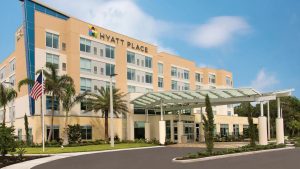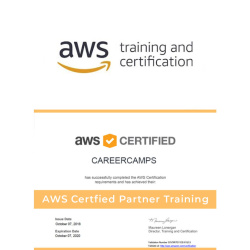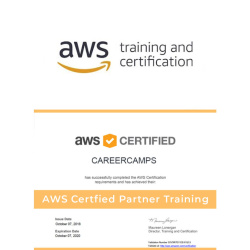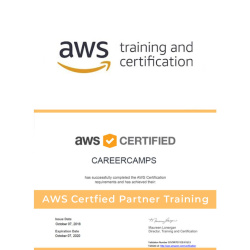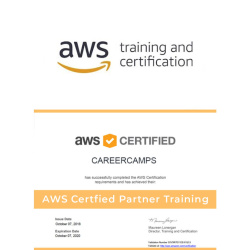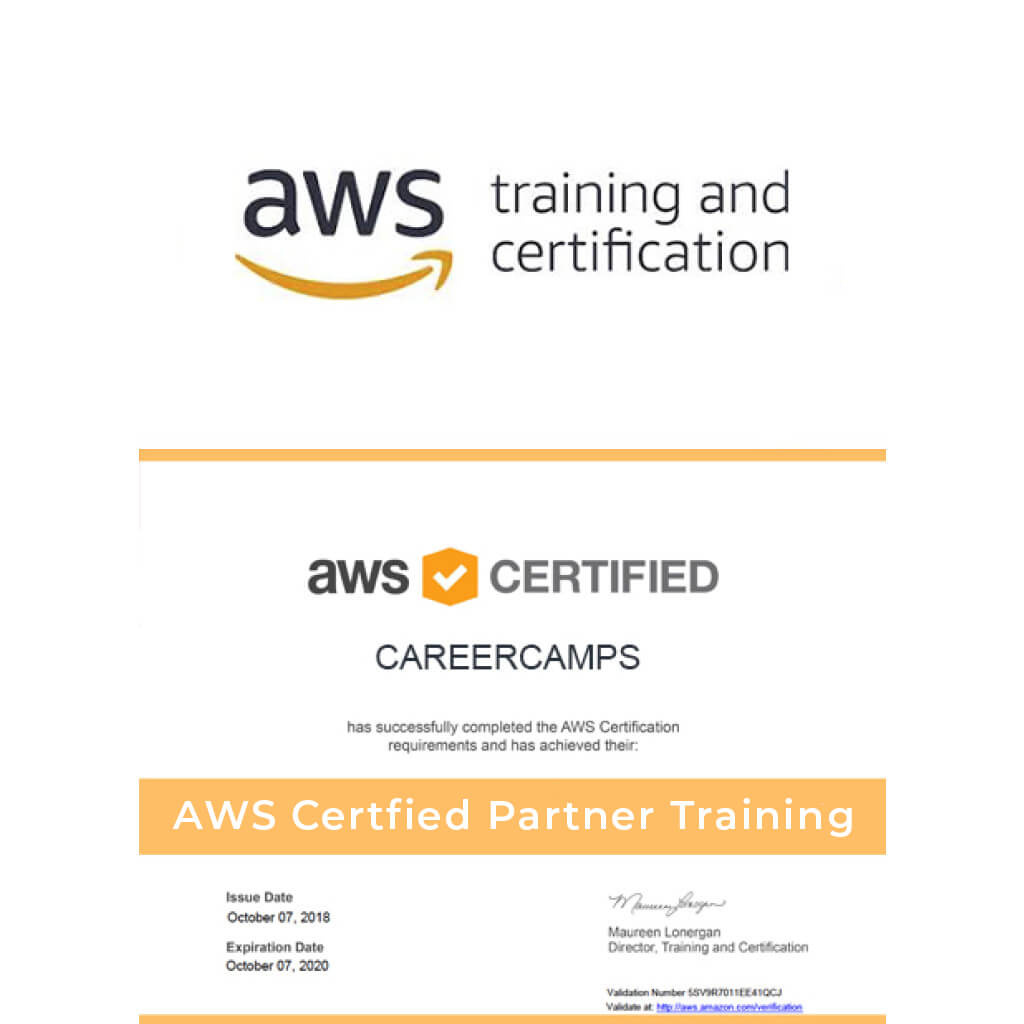
AWS Cloud Practitioner Essentials & AWS Certified Solutions Architect Associate Certification Camp (2 Courses, 2 Exams, 2 Certs)
$3,495.00
The AWS Cloud Practitioner Essentials & AWS Certified Solutions Architect Associate 5 day Boot Camp is the perfect camp for administrators starting out with Amazon AWS. This camp covers the material needed to build foundations and you take TWO official Amazon AWS certification exams during the camp to achieve the Amazon Foundational & Certified Solutions Associate official certifications.
This course is for individuals who seek an overall understanding of the Amazon Web Services (AWS) Cloud. You will learn about AWS Cloud concepts, AWS services, security, architecture, pricing, and support to build your AWS Cloud knowledge. This course also helps you prepare for the AWS Certified Cloud Practitioner & AWS Certified Solutions Architect Associate exams. Additionally will learn to identify services and features to build resilient, secure and highly availabertle IT solutions on the AWS Cloud. If you are looking for the AWS Associate and Professional, please check out our combo camp, the AWS Certified Solutions Architect Associate & Professional Certification Camp.
EXAMS INCLUDED
CLF-C02: AWS Cloud Practitioner Essentials
SAA-C03: AWS Certified Solutions Architect – Associate
WHAT IS INCLUDED
| Airfare to/from Sarasota, FL | |
| 5 Nights of Lodging | |
| Ground Transportation | |
| 2 Amazon AWS Courses | |
| 2 Amazon AWS Exam Vouchers | |
| 1 Retake Voucher (per exam, if needed) | |
| Onsite Pearson Vue Test Center | |
| Amazon AWS Study Labs & Simulations |
LOCATIONS
Career Camps primary AWS Training campus (for individual students) is located in Sarasota, FL. Can’t travel to our facility? No problem! You will save on airfare, lodging and transportation. Just contact us and we will get you pricing to attend the class online live virtually from your work or home. If you do not see the location or class you are looking for, let us know! We have access to hundreds of classes and locations all across the United States and also offer corporate and group rates. If you have 5 or more students we can even come to you! With several partnerships in place, we are sure to have something to fit your needs. Whether you need to get Assocaite or Professional Certified, or get updated on Amazon Certifications, we’ve got you covered.
Description
While attending this camp – students take TWO official Amazon AWS exams to achieve the AWS Certified Cloud Practitioner & AWS Certified Solutions Architect Associate certifications.
Skills Gained:
Summarize the working definition of AWS
Differentiate between on-premises, hybrid-cloud, and all-in cloud
Describe the basic global infrastructure of the AWS Cloud
Explain the six benefits of the AWS Cloud
Describe and provide an example of the core AWS services, including compute, network, databases, and storage
Identify an appropriate solution using AWS Cloud services with various use cases
Describe the AWS Well-Architected Framework
Explain the shared responsibility model
Describe the core security services within the AWS Cloud
Describe the basics of AWS Cloud migration
Articulate the financial benefits of the AWS Cloud for an organization’s cost management
Define the core billing, account management, and pricing models
Explain how to use pricing tools to make cost-effective choices for AWS services
Identify AWS architecting basic practices.
Explore using the AWS management tools: The AWS Console, Command Line Interface (CLI), and CloudFormation in a lab environment.
Examine the enforcement of accounts security using policies.
Identify the elements that build an elastic, secure, virtual network that includes private and public subnets.
Practice building an AWS core networking infrastructure.
Determine strategies for a layered security approach to Virtual Private Cloud (VPC) subnets.
Identify strategies to select the appropriate compute resources based on business use-cases.
Practice building a VPC and adding an Elastic Cloud Compute (EC2) instance in a lab environment.
Practice installing an Amazon Relational Database Service (RDS) instance and an Application Load Balancer (ALB) in the VPC you created.
Compare and contrast AWS storage products and services, based on business scenarios.
Compare and contrast the different types of AWS database services based on business needs.
Practice building a highly available, auto-scaling database layer in a lab.
Explore the business value of AWS monitoring solutions.
Identify the role of monitoring, event driven load balancing, and auto scaling responses, based on usage and needs.
Identify and discuss AWS automation tools that will help you build, maintain and evolve your infrastructure.
Discuss network peering, VPC endpoints, gateway and routing solutions based on use-cases.
Discuss hybrid networking configurations to extend and secure your infrastructure.
Discuss the benefits of microservices as an effective decoupling strategy to power highly available applications at scale.
Explore AWS container services for the rapid implementation of an infrastructure-agnostic, portable application environment.
Identify the business and security benefits of AWS serverless services based on business examples.
Practice building a serverless infrastructure in a lab environment.
Discuss the ways in which AWS edge services address latency and security.
Practice building a CloudFront deployment with an S3 backend in a lab environment.
Explore AWS backup, recovery solutions, and best practices to ensure resiliency and business continuity.
Build a highly available and secure cloud architecture based on a business problem, in a project-based facilitator-guided lab.
Topics Covered in this Official Boot Camp:
Introduction to Amazon Web Services
Summarize the benefits of AWS
Describe differences between on-demand delivery and cloud deployments
Summarize the pay-as-you-go pricing model
Compute in the Cloud
Describe the benefits of Amazon Elastic Compute Cloud (Amazon EC2) at a basic level
Identify the different Amazon EC2 instance types
Differentiate between the various billing options for Amazon EC2
Describe the benefits of Amazon EC2 Auto Scaling
Summarize the benefits of Elastic Load Balancing
Give an example of the uses for Elastic Load Balancing
Summarize the differences between Amazon Simple Notification Service (Amazon SNS) and Amazon Simple Queue Services (Amazon SQS)
Summarize additional AWS compute options
Global Infrastructure and Reliability
Summarize the benefits of the AWS Global Infrastructure
Describe the basic concept of Availability Zones
Describe the benefits of Amazon CloudFront and Edge locations
Compare different methods for provisioning AWS services
Networking
Describe the basic concepts of networking
Describe the difference between public and private networking resources
Explain a virtual private gateway using a real life scenario
Explain a virtual private network (VPN) using a real life scenario
Describe the benefit of AWS Direct Connect
Describe the benefit of hybrid deployments
Describe the layers of security used in an IT strategy
Describe which services are used to interact with the AWS global network
Storage and Databases
Summarize the basic concept of storage and databases
Describe benefits of Amazon Elastic Block Store (Amazon EBS)
Describe benefits of Amazon Simple Storage Service (Amazon S3)
Describe the benefits of Amazon Elastic File System (Amazon EFS)
Summarize various storage solutions
Describe the benefits of Amazon Relational Database Service (Amazon RDS)
Describe the benefits of Amazon DynamoDB
Summarize various database services
Security
Explain the benefits of the shared responsibility model
Describe multi-factor authentication (MFA)
Differentiate between the AWS Identity and Access Management (IAM) security levels
Describe security policies at a basic level
Explain the benefits of AWS Organizations
Summarize the benefits of compliance with AWS
Explain primary AWS security services at a basic level
Monitoring and Analytics
Summarize approaches to monitoring your AWS environment
Describe the benefits of Amazon CloudWatch
Describe the benefits of AWS CloudTrail
Describe the benefits of AWS Trusted Advisor
Pricing and Support
Understand AWS pricing and support models
Describe the AWS Free Tier
Describe key benefits of AWS Organizations and consolidated billing
Explain the benefits of AWS Budgets
Explain the benefits of AWS Cost Explorer
Explain the primary benefits of the AWS Pricing Calculator
Distinguish between the various AWS Support Plans
Describe the benefits of AWS Marketplace
Migration and Innovation
Understand migration and innovation in the AWS Cloud
Summarize the AWS Cloud Adoption Framework (AWS CAF)
Summarize six key factors of a cloud migration strategy
Describe the benefits of various AWS data migration solutions, such as AWS Snowcone, AWS Snowball, and AWS Snowmobile
Summarize the broad scope of innovative solutions that AWS offers
Summarize the five pillars of the AWS Well-Architected Framework
AWS Certified Cloud Practitioner Basics
Determine resources for preparing for the AWS Certified Cloud Practitioner examination
Describe benefits of becoming AWS Certified
Architecting Fundamentals Review
AWS Services and Infrastructure
Infrastructure Models
AWS API Tools
Securing your infrastructure
The Well-Architected Framework
Hands-on lab: Explore Using the AWS API Tools to Deploy an EC2 Instance
Account Security
Security Principals
Identity and Resource-Based Policies
Account Federation
Introduction to Managing Multiple Accounts
Networking, Part 1
IP Addressing
Amazon Virtual Private Cloud (VPC), Patterns and Quotas
Routing
Internet Access
Network Access Control Lists (NACLs)
Security Groups
Compute
Amazon Elastic Cloud Compute (EC2)
EC2 Instances and Instance Selection
High Performance Computing on AWS
Lambda and EC2, When to Use Which
Hands-On Lab: Build Your Amazon VPC Infrastructure
Storage
Amazon S3, Security, Versioning and Storage Classes
Shared File Systems
Data Migration Tools
Database Services
AWS Database Solutions
Amazon Relational Database Services (RDS)
DynamoDB, Features and Use Cases
Redshift, Features, Use Cases and Comparison with RDS
Caching and Migrating Data
Hands-on Lab: Create a Database Layer in Your Amazon VPC Infrastructure
Monitoring and Scaling
Monitoring: CloudWatch, CloudTrail, and VPC Flow Logs
Invoking Events
Automation
CloudFormation
AWS Systems Manager
Containers
Microservices
Monitoring Microservices with X-Ray
Containers
Networking, Part 2
VPC Peering & Endpoints
Transit Gateway
Hybrid Networking
Route 53
Serverless Architecture
Amazon API Gateway
Amazon SQS, Amazon SNS
Amazon Kinesis Data Streams & Kinesis Firehose
Step Functions
Hands-on Lab: Build a Serverless Architecture
Edge Services
Edge Fundamentals
Amazon CloudFront
AWS Global Accelerator
AWS Web Application Firewall (WAF), DDoS and Firewall Manager
AWS Outposts
Hands-On Lab: Configure an Amazon CloudFront Distribution with an Amazon S3 Origin
Backup and Recovery
Planning for Disaster Recovery
AWS Backup
Recovery Strategie
Additional information
| Class Dates | 07/28/2025 – 08/01/2025 – Sarasota, FL, 08/25/2025 – 08/29/2025 – Sarasota, FL, 09/29/2025 – 10/03/2025 – Sarasota, FL, 10/27/2025 – 10/31/2025 – Sarasota, FL |
|---|
Our Facilities
CAREER CAMPS FACILITIES

CLASSROOM EQUIPMENT – Students work on a dedicated Dell Client Desktop with 32GB memory with 512GB SSD drives – All Labs are executed the extremely fast Microsoft Data Center Hosted Lab Environment.
CAMPUS INTERNET – The campus is connected with a 1Gbps (1,000 Mbps) Verizon Fios Business Connection which provides complete internet (including VPN) access for students.
COMMON AREA – Amenities including snacks, drinks (Coffee, 100% juices, sodas, etc) all complimentary.
LODGING – We use the Hyatt Place Lakewood Ranch. This “upgraded” hotel offers extremely comfortable beds, great breakfast and very fast internet access.
NEAR BY AMENITIES – Many shops, restaurants and grocery options are available within walking distance. Additionally – the hotel provided scheduled shuttle services. Restaurants like Bone Fish Grill, Ruby Tuesday’s, Five Guys, Chipotle, Quiznos, Chili’s and over 20 additional choices in the immediate area. All of these options are offered in a pedestrian walking village.
Why Choose Us
CAREER CAMPS DIFFERENCE
Career Camps provides an in-depth hands on learning environment. Our instructors teach using demonstrations and explain concepts beyond the scope of the courseware. The best instructors are contracted from all across the US. These professionals are real world consultants who actually implement these technologies. Career Camps knows our clients work in the “real world” and it only makes sense to have an instructor with the experience in the real world.
Facilities – Many of our competitors over-crowd classrooms by placing 2 to 3 students per desk and 20+ students per instructor. Often these companies “extend” the life of very old equipment with slow performance on the software used today. Our average class size is 8 students. Our facilities have the best equipment with the most comfortable, focused environment for learning.
Instructors – Our CEO, Chester Flake holds one of the rarest Microsoft Certifications – the Microsoft Certified Learning Consultant (MCLC) Certification. This certification reflects a commitment to make sure our instructors are also actively engaged in real world consulting projects. Students expect a professional who can answer questions and demonstrate the technology.
Face to Face Training – We believe the best way to interact and learn is face to face training. Many of our competitors which offer local training are simply providing students with headphones/mic to attend class with an instructor at a remote location.
Test Pass – We offer a free retake voucher (if needed) for each of the exams required for certification. Any training center offering a “100% pass guarantee” would have to use unethical practices or unlimited test vouchers (which is not likely or practical).
Distractions – Students often look for a “local” training center so they can be close to home and work. Boot camp requires a tremendous time commitment during the program. Long class hours combined with self study each evening. The goal of boot camp is to achieve certification in a fraction of the time. We strongly recommend students attend camp away from home and work in a focused, distraction free environment.
Boot Camp – Boot camp is an accelerated training focused on teaching technology and testing students on the official exams. Most training providers “added” boot camps to the existing standard training classes they offer. These training centers think a boot camp is just a regular class where you send the student home with a voucher on the last day. Career Camps administers exams throughout the camp. Equally important – not every trainer can teach a boot camp and not all courseware is designed for boot camp format. Our trainers know the boot camp format and our courseware is designed for accelerated learning.
Florida – Career Camps has one of the most scenic locations boasting some of the best weather in US. We believe students should have a comfortable and inviting atmosphere while attending these otherwise intense programs. We place our location, facilities and amenities up against that any competitor.
AWS Architect Certification Path
The Career Camps AWS Solutions Architect bootcamp is designed for solutions architects, solution design engineers, and anyone who wants to learn how to design applications and systems on AWS. Build your technical skills and progress along a path to earn AWS Certification with the courses, labs, and exams administered in this camp.
You May Also Like:
Related products
-
Advanced Architecting on AWS Training Course
$2,495.00 Select options This product has multiple variants. The options may be chosen on the product page -
Architecting on AWS Training Course
$2,495.00 Select options This product has multiple variants. The options may be chosen on the product page -
AWS Cloud Practitioner Essentials Training Class
$995.00 Select options This product has multiple variants. The options may be chosen on the product page -
AWS Certified Solutions Architect Associate & Professional Certification Camp (2 Course, 2 Exams, 2 Cert)
$4,495.00 Select options This product has multiple variants. The options may be chosen on the product page
